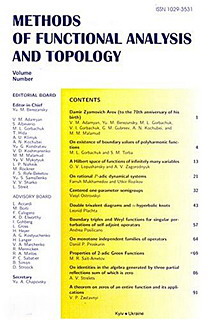Methods of Functional Analysis
and Topology
Editors-in-Chief: A. N. Kochubei,
G. M. Torbin
ISSN: 1029-3531 (Print), 2415-7503 (Online)
Founded by Yu. M. Berezansky in 1995.
Methods of Functional Analysis and Topology (MFAT), founded in 1995, is a peer-reviewed journal publishing original articles and surveys on general methods and techniques of functional analysis and topology with a special emphasis on applications to modern mathematical physics.
MFAT is an open access journal, free for authors and free for readers.
Indexed in: MathSciNet, zbMATH, Scopus, Web of Science, DOAJ, Google Scholar
Latest Articles (September, 2025)
Bisingular Integral with Summable Density
↓ Abstract
MFAT 31 (2025), no. 3, 153-160
153-160
In this paper, we introduce new metric characteristics in the space of summable functions. Using these metric characteristics it is obtained Zigmund-type inequalities for the bisingular integral. It is constructed an invariant $T_p$ space for bisingular integral operator according to the inequality. Furthermore, the existence and uniqueness of the solution to the nonlinear bisingular integral equation within the invariant space $T_p$ are proven using the method of successive approximations.
Fixed Point Theorem for $\psi$-Geraghty Contraction Type Mappings in b-Metric Spaces with Application
Sabita Kumari, Sandip Shrivastava, Shraddha Rajput
MFAT 31 (2025), no. 3, 238-246
238-246
In this paper, we introduce a new class of contractive mappings, called generalized $\psi$-Geraghty contractions, in the framework of b-complete metric spaces. We establish a unique fixed-point theorem that extends existing results in fixed-point theory. An illustrative example with a graphical representation demonstrates the validity of our findings. Furthermore, we apply the main result to an integral equation, highlighting its effectiveness in ensuring the existence and uniqueness of solutions. This work underscores the theoretical significance and practical applicability of generalized $\psi$-Geraghty contractions in mathematics, physics, and engineering.
Inequality of Riemann-Stieltjes-$ \Delta $-Integral for Hilbert Spaces on Time Scales
Bosede Alfred O., Afariogun David A., Ayeni Elizebeth O.
MFAT 31 (2025), no. 3, 161-171
161-171
In this paper, the inequality of Riemann-Stieltjes integral is defined for functions of Hilbert space. The concept of time scales is introduced to unify both discrete and continuous problems. Also, the definition and properties of Riemann-Stieltjes integral are used in the application of self-adjoint and unitary operators in Hilbert spaces. Thees results are obtained on time scales.
On $m$-quasi-$n$-power-totally-$(\alpha,\beta)$-normal operators
Pradeep Radhakrishnan, Sid Ahmed Ould Ahmed Mahmoud, P. Maheswari Naik
MFAT 31 (2025), no. 3, 247-260
247-260
In this paper, we introduce the notion of $m$-quasi-$n$-power-totally-$(\alpha,\beta)$-normal operators on a Hilbert space $\mathscr{H}$ as : An operator $\mathcal{L}$ is called $m$-quasi-$n$-power-totally-$(\alpha,\beta)$-normal $(0\leq \alpha \leq 1 \leq \beta)$ if \begin{align*} \alpha^{2}\mathcal{L}^{m*}(\mathcal{L}-\lambda)^{*}(\mathcal{L}-\lambda )^{n}\mathcal{L}^{m}& \leq \mathcal{L}^{m*}(\mathcal{L}-\lambda)^{n}(\mathcal{L}-\lambda)^{*}\mathcal{L}^{m}\\ &\leq \beta^{2} \mathcal{L}^{m*}(\mathcal{L}-\lambda)^{*}(\mathcal{L}-\lambda )^{n}\mathcal{L}^{m} \end{align*} for natural numbers $m$ and $n$ and for all $\lambda \in \mathbb{C}$. This paper aims to study several properties of $m$-quasi-$n$-power-totally-$(\alpha,\beta)$-normal operators.

